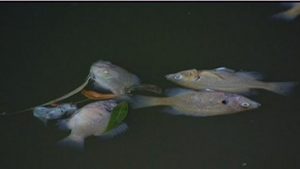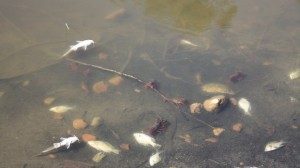 Fish die as a result of a wide variety of natural and unnatural causes. Fish may die of old age, starvation, body injury, stress, suffocation, water pollution, diseases, parasites, predation, toxic algae, severe weather, and other reasons. A few dead fish floating on the surface of a pond or lake is not necessarily cause for alarm. Expect some fish to die of old age, injury, winter starvation, or even
Fish die as a result of a wide variety of natural and unnatural causes. Fish may die of old age, starvation, body injury, stress, suffocation, water pollution, diseases, parasites, predation, toxic algae, severe weather, and other reasons. A few dead fish floating on the surface of a pond or lake is not necessarily cause for alarm. Expect some fish to die of old age, injury, winter starvation, or even
post-spawning stress in the springtime. However, when large numbers of fish of all sizes are found dead and dying over a long period of time, it is necessary to investigate and determine the cause.
Sudden, large fish kills in ponds are often the result of fish suffocation caused by night time oxygen depletion in the summer. Fish kills from oxygen depletion usually occur in the early morning hours (at dawn) in very rich (green water) ponds following:
- the die-off of a large algae bloom
- the decay of water weeds after treatment with a herbicide
- the turnover of oxygen-poor bottom waters following a thunderstorm
- the runoff of livestock waste and other organics after a heavy rain
Symptoms of oxygen depletion may include an abnormal distribution of fish gulping at the water surface or at the pond inlet or edges. Large fish may die first, but all sizes of fish are usually affected. The color and clarity of pond water may change and a foul odor may be released. Fish kills from pesticides, chlorine, gasoline, fuel oil, ammonia fertilizer, acids, and other toxic chemicals are not as common in private ponds, but can occur.
 In order to prevent fish suffocation in fertile ponds:
In order to prevent fish suffocation in fertile ponds:
- Do not over fertilize ponds.
- Do not overstock fish.
- Do not feed ducks.
- Fence livestock from the pond and upstream waters.
- Prevent manure and animal waste runoff into the pond.
- Use herbicides only in the Spring and Fall.
- Treat only one-third of the pond surface each time with herbicide.
- Install aeration system
Water quality tests
Water quality tests are usually expensive, complicated, and may be inconclusive. A number of water samples from the surface and bottom waters and from the pond entrance and exit waters are usually required to identify a problem. Moreover, because pond water quality may change rapidly (within hours), just determining that oxygen levels in the afternoon are adequate for fish following a nighttime fish kill may be meaningless. Fish farmers usually conduct water quality tests daily to establish the pattern of conditions in their ponds, but most private pond owners do not monitor their pond water quality.
